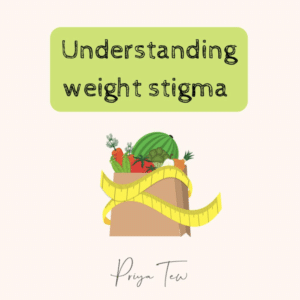Weight stigma is, according to The Lancet, is the discrimination, stereotyping, and social exclusion based on a person’s weight. This can come from a bias and perception of people in larger bodies, such as concepts of them being lazy, lacking willpower and even being unhygienic or unintelligent. However, character traits are completely separate to someone’s size or appearance.
Weight stigma can come from individuals, such as negative comments and body language or even assault. Research has shown that weight bias can be seen in children as young as 5 (1). However, it can also be systematic, such as narrow seating, difficulty finding clothes and an emphasis on weight loss when seeking medical support.
Weight stigma has been shown to impact different areas of a person’s life, right down to their likelihood to get a job or promotion. One of the most concerning impacts of weight stigma is that it influences the level of care someone may be able to access in medical and healthcare settings. Weight can often be attributed to a broad range of conditions that a person may come to a healthcare professional for. At one end of the spectrum, this can be frustrating and distract from identifying other causes and solutions that aren’t weight-related. On the other end, serious health conditions may be overlooked or missed entirely.
When the focus is on weight, rather than health, we can lose sight of what is actually important to our wellbeing. For example, going on restrictive diets, replacing meals with nutrient-poor shakes or even taking fat burning tablets may result in short term weight loss, but could lead to deficiencies in key nutrients. Moreover, yo-yo dieting places the body under stress that is likely to be much more harmful than being in a larger body with a consistent way of eating.
In terms of our health, emerging research is looking at the negative impact that weight stigma may have on us. In fact, there are calls to account for weight stigma in studies in the same way that we account for smoking and other factors that could impact results. Weight stigma can increase stress and psychological distress that a person may feel. This can influence behaviours and is associated with an increased risk of certain eating disorders and disordered eating behaviours, Moreover, chronic stress can have strong physiological impacts on the body associated with poor health. Ironically, many of these areas are the ones that we associate with being overweight including raised blood pressure and increased cortisol reactivity (2).
Because weight stigma can be so systemic, it is difficult to extricate yourself from. If you are in a smaller body, being an ally for those facing weight stigma can be a good step, such as by supporting them when they need to advocate for themselves. If you experience weight stigma yourself in a healthcare setting, asking “what would you recommend if I were in a smaller body” or even requesting to see a different healthcare professional are within your rights. Working on internalised weight stigma can take time, regardless of the size of your body. However, becoming aware of its prevalence is a great first step to unraveling your own biases to a more weight neutral mindset.
Huge thanks to Elle Coales @enliveningelle for her help with this post.
- Spiel, E.C., Paxton, S.J. and Yager, Z., 2012. Weight attitudes in 3-to 5-year-old children: Age differences and cross-sectional predictors. Body image, 9(4), pp.524-527.
- Pearl, R.L., Wadden, T.A., Hopkins, C.M., Shaw, J.A., Hayes, M.R., Bakizada, Z.M., Alfaris, N., Chao, A.M., Pinkasavage, E., Berkowitz, R.I. and Alamuddin, N., 2017. Association between weight bias internalization and metabolic syndrome among treatment‐seeking individuals with obesity. Obesity, 25(2), pp.317-322.
